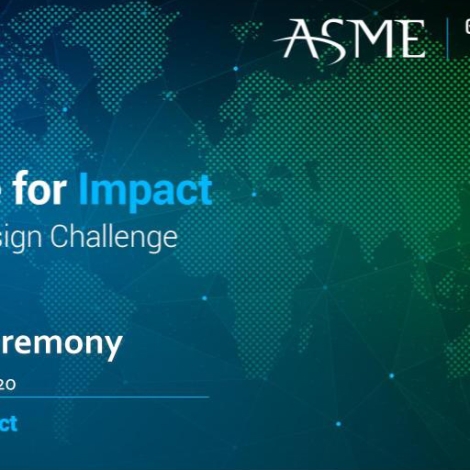Two engineering design teams that placed people at the center of their design process won the Innovate for Impact: Siemens Design Challenge, announced in a virtual awards ceremony on September 15. The design team behind EcoLife Cold Room won the Zero Hunger track with a cold storage facility they developed in tandem with Ugandan farmers. And Apü üya Wüin – The Guardian of Water won the Clean Water track with a solar-powered water desalination device they created together with members of the Parenskat indigenous community in the Guajira region of Colombia.
The winners will receive $10,000 to advance their prototypes, as well as expert consultation and promotion from the competition’s hosts, the global technology firm Siemens, the knowledge-sharing non-profit Engineering for Change and our parent organization, the American Society of Mechanical Engineers. Their fist promotional event will be at the Tech Gallery at Impact.Engineered 2020, the conference for rising stars and leading minds in global development engineering and social innovation. For many of the winners, this will their first foray into the global “tech for good” network, of which they are now a part.
The winning teams faced an avalanche of competition over the past six months when applications opened in early March. More than 23,000 people participated, submitting 220 designs.
“We had interest from 34 countries and over 43 universities. I think about that kind of connectedness in the midst of a global pandemic, and I’m inspired,” Barbara Humpton, CEO of Siemens USA said in the awards event.
“Every one of you is a game changer. Every one of you is showing us how the power of technology can really deepen our human connections and make the world a better place for all of us,” Ms. Humpton says.
The virtual event prompted off-the-cuff, thought-provoking words from hosts, recipients and also representatives of the expert panels of judges.
Clean Water Track Winners: Apü üya Wüin – The Guardian of Water
“Fifty percent of projects fail in the first five years. Because they lack looking at the deployment ecosystem. They focus exclusively on the technology, and not everything that is needed to advance the technology. Well this challenge is different. You made sure that through the phases, all of the things within the deployment ecosystem were focused on. Supply chain, regulations, community engagement. Everything that is so critical to sustained success is part of this challenge,” Dan Bena, a judge for the challenge, Sr. Advisor to Safe Water Network and former Corporate Water Steward for PespsiCo, said in his introduction to the winner of the Clean Water track, Apü üya Wüin – The Guardian of Water.
“This team in particular focused on community engagement. And not only as a single snapshot. They didn’t only go into the community and do a survey. They literally made the community part of the process from the beginning all the way through to the community actually co-creating and co-owning improvement to that process,” Mr. Bena says.
The Apü üya Wüin team includes Jhonn Aguilar, Manuel Mejía, Mónica Gutiérrez, Aliex Trujillo and Sebastian Rodriguez. They worked with members of the Parenskat indigenous community in the arid Guajira region of Colombia to produce a solar-powered water desalinator. As the team explains in the one-minute video pitch below, their device treats four liters of brackish water per day. It is also designed for distribution. The device breaks down to fit into a 1x.3-meter flatpack for shipping, and it can be assembled by anyone without the requirement of technical expertise. The team took the “elevator pitch” moniker literally, quickly describing their idea while standing in an elevator.
Zero Hunger Track Winners: EcoLife Cold Room
“This team’s unique approach to cold storage, which utilized wall panels made of locally available materials, creates an affordable, easy-to-maintain and off-grid-compatible solution,” Camille Johnston, Sr. Vice President of Corporate Affairs at Siemens USA, said in her introduction to the EcoLife Cold Room team.
The EcoLife team includes Hadijah Nantambi, Ian Williams and Kyle Gaiser representing Uganda and the United States. As Mr. Gaiser explains in his one-minute pitch, the wall panels are the heart of the cold room technology.
“EcoLife is working alongside off-grid farmers to create a cold room to contribute to the sustainable development goal of Zero Hunger. Our innovation lies within its one-of-a-kind wall panels, which combine structure, insulation and thermal energy storage. The cold store is made from locally available materials, so it is affordable and easy to maintain. And the thermal energy system is off-grid compatible,” Mr. Gaiser says.
About the Challenge
The challenge was conceived as a call to action for socially minded engineers, offering design options in two tracks. The Zero Hunger Track called for new technology that reduces post-harvest losses on farms and in the food delivery chain. It coincides with the United Nations’ Sustainable Development Goal Two (SDG 2). The Clean Water Track requested improvements in desalination technology to treat brackish water in an affordable way, aligning with SDG 6.
Participants included engineering students, practicing engineers, faculty, entrepreneurs, and global development practitioners from all over the world.
“We created this challenge nearly a year ago with the purpose of discovery at the forefront of our goals, and what we received in response has exceeded our expectations,” Ms. Humpton says. “Rising to the top among hundreds, I congratulate our two winners for embodying Siemens’ mission of using technology to serve society by creating two exceptional, yet practical innovations.”
ASME’s E4C team architected the application and evaluation process, educated participants on human-centered design principles, and provided tools and resources. Siemens provided free access and training on cutting-edge technology tools for digital design and engineering from its Xcelerator™ portfolio, including Solid Edge® software and a new co-creation platform developed with Siemens’ Mendix™ platform for low-code application development. Siemens’ software is widely used by many of the world’s leading companies to design, engineer and manufacture all types of products and infrastructure.
“Over the course of the Challenge phases, the judges focused on the most promising submissions in terms of their technological merit, adoption potential, scalability, and ultimately their impact on quality of life,” says Iana Aranda, E4C’s President and Director of Engineering Global Development programs for ASME. “These two teams excelled consistently while integrating the judges’ feedback throughout the Challenge. Their solutions truly strive for sustainability and embody the principles of human-centered design.”
Ms. Aranda closed the awards ceremony with encouragement to all of the design challenge participants. “The world really needs your spirit, your intelligence and your capacity,” she says.
Please see the awards ceremony in the video below.
And see all eight finalists’ pitch their innovations in one-minute videos in this playlist.
For more information about Innovate for Impact: Siemens Design Challenge, please visit https://bit.ly/2UTJKmS.

